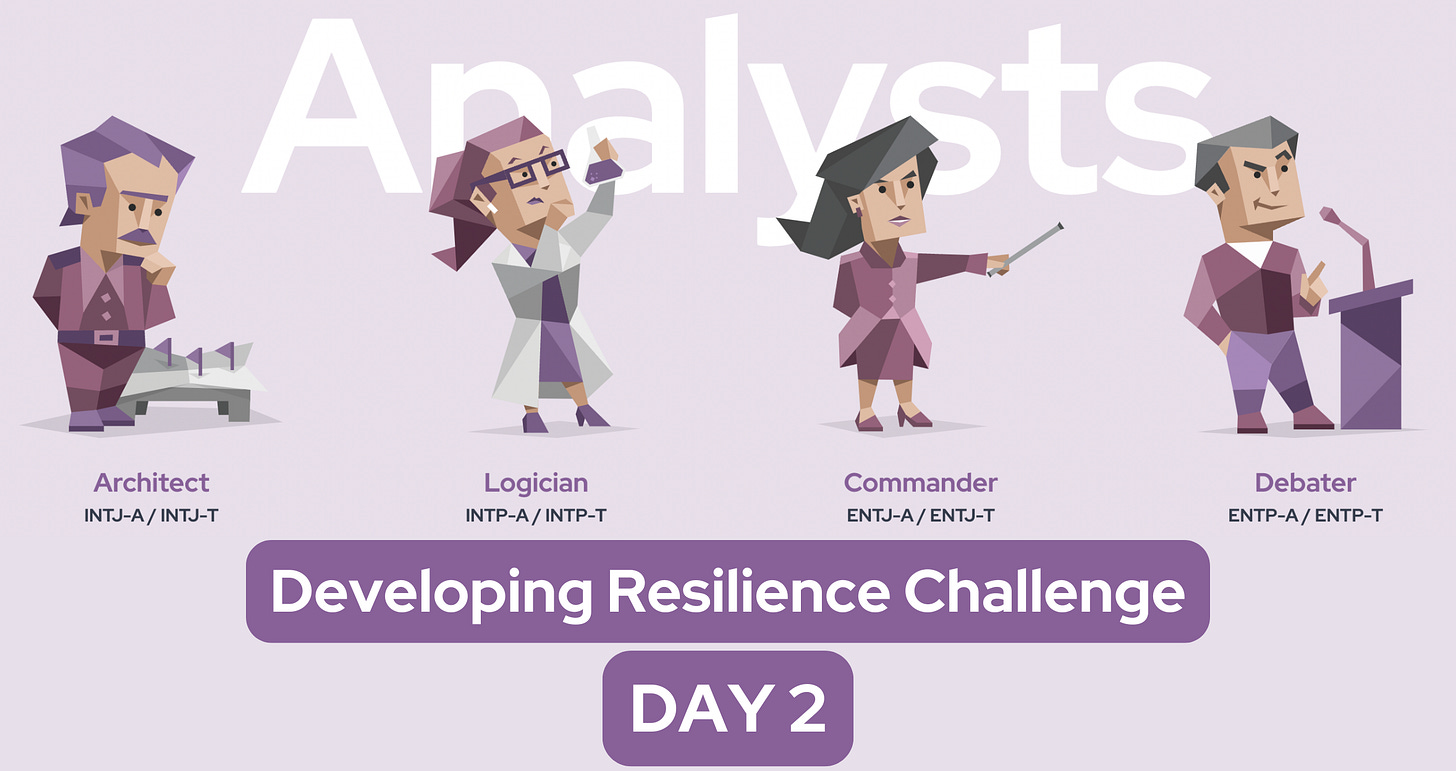The Last Straw: Testing an Analyst’s Resilience
Part 2 of 5 in our Developing Resilience Challenge: Uncover the subtle leadership missteps that quietly test Analysts’ resilience and push them to the edge
Do you lead an Analyst (INTJ | INTP | ENTJ | ENTP)?
Analysts include all personality types who share the Intuitive and Thinking personality traits. They embrace rationality and impartiality, excelling in intellectual debates. They are fiercely independent, open-minded, strong-willed, and imaginative, approaching many things from a utilitarian perspective and being far more interested in what works than what satisfies everybody.
Welcome to Day 2 of our five-day Developing Resilience Challenge! Today, we have a little story for you to help shed light on the challenges that test Analysts’ resilience – a.k.a. their ability to bounce back from setbacks.
(For solutions for building resilience, stay tuned for upcoming articles on each Analyst personality type.)
Real quick, here’s a recap of your five-day Developing Resilience Challenge:
Day 2: Testing Resilience in Analysts (You are here)
Day 3: Testing Resilience in Diplomats
Day 4: Testing Resilience in Sentinels
Day 5: Testing Resilience in Explorers
Story Time: Alex the Analyst’s Breaking Point
Standing in my boss’s office, I watched as my boss casually dismissed my meticulously researched proposal. Her words cut through me like a knife: “Alex, I appreciate your enthusiasm, but we can’t overhaul our entire system based on a hunch. I feel like we have protocols for a reason.”
Overhaul our entire system? I thought. Is she serious? I was proposing a simple procedural change to remove a redundancy, not a complete restructuring of the system!
As she continued, appealing to team morale and the difficulty of change, I felt a familiar frustration reaching its boiling point. This wasn’t just another rejected idea – it was the final straw. I came to the disappointing realization that my logical arguments and innovative solutions meant little in an environment that prioritizes emotional appeals and rigid adherence to the status quo.
*Pause story*
Whew. Tricky situation. Let’s look at things from Alex the Analyst’s perspective. What made this encounter particularly frustrating and demoralizing for Alex, and why might he struggle to bounce back from it?
*Resume story*
“My boss shuts down my ideas.”
The outright rejection of my procedural change hurt. I had invested a lot of time analyzing data and crafting a proposal that I knew would improve our team’s efficiency. To have it dismissed without proper consideration felt like a direct assault on my intellectual capabilities and my value to the organization.
For me, innovation isn’t just a buzzword – it’s a fundamental drive. I thrive on developing novel solutions to complex problems, and I’m good at seeing patterns and possibilities that others miss. When my ideas are summarily dismissed, it not only frustrates me but also makes me question my role within the organization. I tie my sense of worth closely to my intellectual contributions.
“My boss micromanages and gives me no freedom.”
My boss’s insistence on following established procedures and her reluctance to consider alternative approaches felt suffocating. I value the freedom to explore new ideas and methodologies. The prospect of being confined to outdated protocols and micromanaged at every turn soured my thoughts as I considered my waning independence.
I like to constantly question and improve upon existing systems. I’m not content with simply following procedures – I need to understand the reasoning behind them and have the freedom to suggest improvements. When this autonomy is restricted, it feels like my most valuable skills are being wasted.
“My boss values sensitivity over effectiveness.”
Perhaps the most galling aspect of my boss’s response was her appeal to team morale and harmony. I prioritize logical reasoning and objective analysis in decision-making, so the suggestion that we should prioritize people’s feelings over potential improvements in efficiency felt not only irrational but also manipulative.
I tend to approach problems from a logical, impersonal standpoint, seeking the most effective solution regardless of how it might be received emotionally. We’re here to do a job and do it well, after all. While I’m not devoid of emotions, I often struggle to understand why decisions would be based primarily on feelings rather than facts and logic.
As I left my boss’s office, I felt a mix of anger, disappointment, and resignation. The realization that my workplace values conformity and emotional appeals over innovation and logical analysis was deeply disheartening – our primary goal should be to optimize processes and outcomes. This encounter might be more than just a momentary setback for me. It has me seriously questioning my place in this workplace.
*End story*
Story Debrief
Keep reading with a 7-day free trial
Subscribe to Leadership by 16Personalities to keep reading this post and get 7 days of free access to the full post archives.



